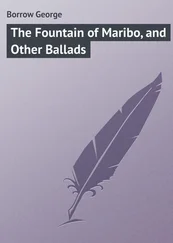George Borrow - The Bible in Spain. Volume 2 of 2
Здесь есть возможность читать онлайн «George Borrow - The Bible in Spain. Volume 2 of 2» — ознакомительный отрывок электронной книги совершенно бесплатно, а после прочтения отрывка купить полную версию. В некоторых случаях можно слушать аудио, скачать через торрент в формате fb2 и присутствует краткое содержание. ISBN: , Жанр: foreign_prose, Путешествия и география, foreign_language, на английском языке. Описание произведения, (предисловие) а так же отзывы посетителей доступны на портале библиотеки ЛибКат.
- Название:The Bible in Spain. Volume 2 of 2
- Автор:
- Жанр:
- Год:неизвестен
- ISBN:http://www.gutenberg.org/ebooks/35676
- Рейтинг книги:4 / 5. Голосов: 1
-
Избранное:Добавить в избранное
- Отзывы:
-
Ваша оценка:
- 80
- 1
- 2
- 3
- 4
- 5
The Bible in Spain. Volume 2 of 2: краткое содержание, описание и аннотация
Предлагаем к чтению аннотацию, описание, краткое содержание или предисловие (зависит от того, что написал сам автор книги «The Bible in Spain. Volume 2 of 2»). Если вы не нашли необходимую информацию о книге — напишите в комментариях, мы постараемся отыскать её.
The Bible in Spain. Volume 2 of 2 — читать онлайн ознакомительный отрывок
Ниже представлен текст книги, разбитый по страницам. Система сохранения места последней прочитанной страницы, позволяет с удобством читать онлайн бесплатно книгу «The Bible in Spain. Volume 2 of 2», без необходимости каждый раз заново искать на чём Вы остановились. Поставьте закладку, и сможете в любой момент перейти на страницу, на которой закончили чтение.
Интервал:
Закладка:
On the day of my arrival I dined at the table-d’hôte of the principal inn, kept by a Genoese. The company was very miscellaneous – French, Germans, and Spaniards, all speaking in their respective languages, whilst at the ends of the table, confronting each other, sat two Catalan merchants, one of whom weighed nearly twenty stone, grunting across the board in their harsh dialect. Long, however, before dinner was concluded the conversation was entirely engrossed and the attention of all present directed to an individual who sat on one side of the bulky Catalan. He was a thin man of about the middle height, with a remarkably red face, and something in his eyes which, if not a squint, bore a striking resemblance to it. He was dressed in a blue military frock, and seemed to take much more pleasure in haranguing than in the fare which was set before him. He spoke perfectly good Spanish, yet his voice betrayed something of a foreign accent. For a long time he descanted with immense volubility on war and all its circumstances, freely criticizing the conduct of the generals, both Carlist and Cristinos , in the present struggle, till at last he exclaimed, “Had I but twenty thousand men allowed me by the government, I would bring the war to a conclusion in six months.”
“Pardon me, sir,” said a Spaniard who sat at the table, “the curiosity which induces me to request the favour of your distinguished name.”
“I am Flinter,” replied the individual in the military frock, “a name which is in the mouth of every man, woman, and child in Spain. I am Flinter 31 31 George Dawson Flinter began life in an English West India regiment, served in the Spanish American forces, and afterwards obtained a commission in the Spanish army. In 1833, on the outbreak of the civil war, he declared for Isabella, and served with considerable distinction in the constitutional army. A prisoner in 1836, he was entrusted with a high command at Toledo in 1837, but having failed to satisfy the Cortes in an engagement in September, 1838, he cut his throat (see Gentl. Mag. , 1838, vol. ii. p. 553, and Duncan, The English in Spain , pp. 13, 189).
the Irishman, just escaped from the Basque provinces and the claws of Don Carlos. On the decease of Ferdinand, I declared for Isabella, esteeming it the duty of every good cavalier and Irishman in the Spanish service to do so. You have all heard of my exploits, and permit me to tell you they would have been yet more glorious had not jealousy been at work and cramped my means. Two years ago I was despatched to Estremadura, to organize the militias. The bands of Gomez and Cabrera entered the province, and spread devastation around. They found me, however, at my post; and had I been properly seconded by those under my command, the two rebels would never have returned to their master to boast of their success. I stood behind my intrenchments. A man advanced and summoned us to surrender. ‘Who are you?’ I demanded. ‘I am Cabrera,’ he replied; ‘and I am Flinter,’ I retorted flourishing my sabre; ‘retire to your battalions, or you will forthwith die the death.’ He was awed, and did as I commanded. In an hour we surrendered. I was led a prisoner to the Basque provinces; and the Carlists rejoiced in the capture they had made, for the name of Flinter had long sounded amongst the Carlist ranks. I was flung into a loathsome dungeon, where I remained twenty months. I was cold; I was naked; but I did not on that account despond – my spirit was too indomitable for such weakness. My keeper at last pitied my misfortunes. He said that ‘it grieved him to see so valiant a man perish in inglorious confinement.’ We laid a plan to escape together; disguises were provided, and we made the attempt. We passed unobserved till we arrived at the Carlist lines above Bilbao: there we were stopped. My presence of mind, however, did not desert me. I was disguised as a carman, as a Catalan, and the coolness of my answers deceived my interrogators. We were permitted to pass, and soon were safe within the walls of Bilbao. There was an illumination that night in the town, for the lion had burst his toils, Flinter had escaped, and was once more returned to reanimate a drooping cause. I have just arrived at Santander, on my way to Madrid, where I intend to ask of the government a command, with twenty thousand men.”
Poor Flinter! a braver heart and a more gasconading mouth were surely never united in the same body. He proceeded to Madrid, and through the influence of the British ambassador, who was his friend, he obtained the command of a small division, with which he contrived to surprise and defeat, in the neighbourhood of Toledo, a body of the Carlists, commanded by Orejita, whose numbers more than trebled his own. In reward for this exploit he was persecuted by the government, which, at that time, was the moderado or juste milieu , with the most relentless animosity; the prime minister, Ofalia, supporting with all his influence numerous and ridiculous accusations of plunder and robbery brought against the too successful general by the Carlist canons of Toledo. He was likewise charged with a dereliction of duty, in having permitted, after the battle of Valdepeñas, which he likewise won in the most gallant manner, the Carlist force to take possession of the mines of Almaden, although the government, who were bent on his ruin, had done all in their power to prevent him from following up his successes, by denying him the slightest supplies and reinforcements. The fruits of victory thus wrested from him, his hopes blighted, a morbid melancholy seized upon the Irishman; he resigned his command, and, in less than ten months from the period when I saw him at Santander, afforded his dastardly and malignant enemies a triumph which satisfied even them, by cutting his own throat with a razor.
Ardent spirits of foreign climes, who hope to distinguish yourselves in the service of Spain, and to earn honours and rewards, remember the fate of Columbus, and of another as brave and as ardent – Flinter!
CHAPTER XXXV
Departure from Santander – The Night Alarm – The Black Pass.
I had ordered two hundred Testaments to be sent to Santander from Madrid: I found, however, to my great sorrow, that they had not arrived, and I supposed that they had either been seized on the way by the Carlists, or that my letter had miscarried. I then thought of applying to England for a supply, but I abandoned the idea for two reasons. In the first place, I should have to remain idly loitering, at least a month, before I could receive them, at a place where every article was excessively dear; and, secondly, I was very unwell, and unable to procure medical advice at Santander. Ever since I left Corunna, I had been afflicted with a terrible dysentery, and latterly with an ophthalmia, the result of the other malady. I therefore determined on returning to Madrid. To effect this, however, seemed no very easy task. Parties of the army of Don Carlos, which, in a partial degree, had been routed in Castile, were hovering about the country through which I should have to pass, more especially in that part called “The Mountains,” so that all communication had ceased between Santander and the southern districts. Nevertheless, I determined to trust as usual in the Almighty, and to risk the danger. I purchased, therefore, a small horse, and sallied forth with Antonio.
Before departing, however, I entered into conference with the booksellers as to what they should do in the event of my finding an opportunity of sending them a stock of Testaments from Madrid; and, having arranged matters to my satisfaction, I committed myself to Providence. I will not dwell long on this journey of three hundred miles. We were in the midst of the fire, yet, strange to say, escaped without a hair of our heads being singed. Robberies, murders, and all kinds of atrocities were perpetrated before, behind, and on both sides of us; but not so much as a dog barked at us, though in one instance a plan had been laid to intercept us. About four leagues from Santander, whilst we were baiting our horses at a village hostelry, I saw a fellow run off after having held a whispering conversation with a boy who was dealing out barley to us. I instantly inquired of the latter what the man had said to him, but only obtained an evasive answer. It appeared afterwards that the conversation was about ourselves. Two or three leagues farther there was an inn and village where we had proposed staying, and indeed had expressed our intention of doing so; but on arriving there, finding that the sun was still far from its bourne, I determined to proceed farther, expecting to meet with a resting-place at the distance of a league; though I was mistaken, as we found none until we reached Montaneda, nine leagues and a half from Santander, where was stationed a small detachment of soldiers. At the dead of night, we were aroused from our sleep by a cry that the “factious” were not far off. A messenger had arrived from the alcalde of the village where we had previously intended staying, who stated that a party of Carlists had just surprised that place, and were searching for an English spy, whom they supposed to be at the inn. The officer commanding the soldiers, upon hearing this, not deeming his own situation a safe one, instantly drew off his men, falling back on a stronger party stationed in a fortified village near at hand. As for ourselves, we saddled our horses and continued our way in the dark. Had the Carlists succeeded in apprehending me, I should instantly have been shot, and my body cast on the rocks to feed the vultures and wolves. But “it was not so written,” said Antonio, who, like many of his countrymen, was a fatalist. The next night we had another singular escape: we had arrived near the entrance of a horrible pass called “ El puerto de la puente de las tablas ,” or the pass of the bridge of planks, which wound through a black and frightful mountain, on the farther side of which was the town of Oñas, where we meant to tarry for the night. The sun had set about a quarter of an hour. Suddenly a man, with his face covered with blood, rushed out of the pass. “Turn back, sir,” he said, “in the name of God; there are murderers in that pass; they have just robbed me of my mule, and all I possess, and I have hardly escaped with life from their hands!” I scarcely know why, but I made him no answer, and proceeded; indeed I was so weary and unwell that I cared not what became of me. We entered; the rocks rose perpendicularly, right and left, entirely intercepting the scanty twilight, so that the darkness of the grave, or rather the blackness of the valley of the shadow of death, reigned around us, and we knew not where we went, but trusted to the instinct of the horses, who moved on with their heads close to the ground. The only sound which we heard was the plash of a stream, which tumbled down the pass. I expected every moment to feel a knife at my throat, but “ it was not so written .” We threaded the pass without meeting a human being, and within three-quarters of an hour after the time we entered it, we found ourselves within the posada of the town of Oñas, which was filled with troops and armed peasants expecting an attack from the grand Carlist army, which was near at hand.
Читать дальшеИнтервал:
Закладка:
Похожие книги на «The Bible in Spain. Volume 2 of 2»
Представляем Вашему вниманию похожие книги на «The Bible in Spain. Volume 2 of 2» списком для выбора. Мы отобрали схожую по названию и смыслу литературу в надежде предоставить читателям больше вариантов отыскать новые, интересные, ещё непрочитанные произведения.
Обсуждение, отзывы о книге «The Bible in Spain. Volume 2 of 2» и просто собственные мнения читателей. Оставьте ваши комментарии, напишите, что Вы думаете о произведении, его смысле или главных героях. Укажите что конкретно понравилось, а что нет, и почему Вы так считаете.












